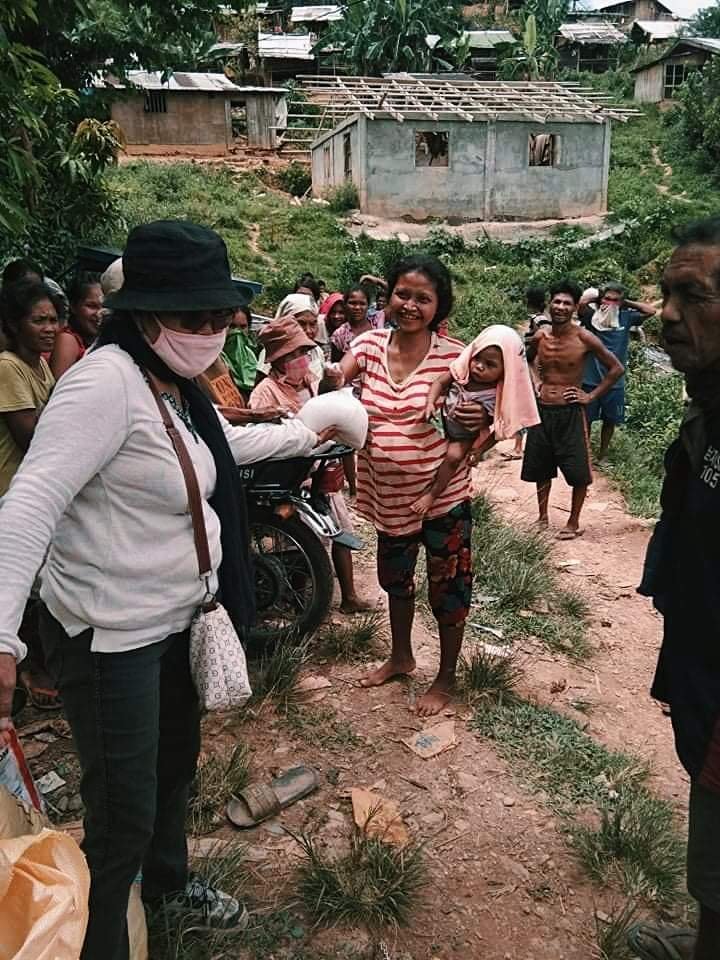
ALBAY, Philippines — Despite the stricter measures imposed by the Department of Interior and Local Government (DILG) on the conduct of relief operations, help from different groups continue to pour in.
The various relief groups do it by getting a permit from LGUs or by directly sending money to community leaders.
One of these relief operations is the "Tulong Anakpawis" initiative organized by the progressive group Anakpawis. (READ: Groups help vulnerable sectors affected by coronavirus lockdown)
Through this initiative, Anakpawis members-volunteers from Marikina City served hot porridge with malunggay and freshly-baked pandesal to children, pregnant women, and breastfeeding mothers in Brgy. Dolores, Taytay, Rizal.
The group also sent sacks of rice and food to 90 construction workers who are currently stranded in Brgy. Don Galo, Parañaque City. Anakpawis learned of the plight of this group when a worker asked reached out to them through social media.
With an LGU permit, Anakpawis also has relief operations in Caloocan and Quezon City.
On April 30, they distributed "nutri-lief" packs to more than 100 urban poor families in Pandacan, Manila. Each pack contained rice and fresh vegetables directly purchased from small farmers.
According to former Anakpawis Representative Ariel Casilao: "The DILG should instead help humanitarian volunteers in smoothly delivering their aid to the distressed communities, and not discredit our relief drive as unauthorized."
Casilao and 6 other volunteers were arrested and later released on bail by the Philippine National Police (PNP) in Norzagaray, Bulacan last April 19 after the DILG did not acknowledge the permit issued by the Bureau of Fisheries and Aquatic Resources for their relief drives.
IPs helped by donation drives
Before the DILG's imposed stringent requirements for relief operations, groups supporting indigenous people were among the first to respond to the needs of marginalized communities during lockdown.

Purple Action for Indigenous Women's Rights (LILAK), through its donation drive campaign BABAYEnihan, was able to distribute cash aides to 11 tribal communities during the second week of the Enhanced Community Quarantine in March. LILAK supports indigenous women in their fight for human rights.
Tuwali leader Myrna Duyan said LILAK sent her money through cash transfer, and she distributed it to 25 households in her community in Brgy. Didipio Kasibu, Nueva Vizcaya. She said some beneficiaries used the money to buy rice and medicine, and for transportation to a clinic.
According to her, the relief goods they received on April 7 from the local government were 5 kilos of rice, 5 canned goods, and 2 packs of noodles. Members of Pantawid Pamilyang Pilipino Program (4Ps) also got their cash aid on April 13 and other beneficiaries of the emergency relief fund on April 28.
Dumagat members in General Nakar in Quezon province also received aid from LILAK. According to the group leader, they had to use a boat to distribute the rice they bought because there was no other mode of transportation.
LILAK organized the donation campaign after IP communities in its network asked for help because of the enhanced community quarantine (ECQ) deprived them of their livelihood.
A caregiver Aeta from Zambales, as well as Higaonons in Bukidnon that work as laborers had to stop working because of the coronavirus outbreak, said LILAK.
A B'laan leader also told LILAK that: "Even before talks of COVID-19, we are preparing for the worst. The dry season came early for us. The heat was too much; our rice, pineapples and vegetables all died."
While they planted crops in their backyard, they didn't have cash to buy rice. They could not sell their produce because of the suspension of public transportation.
Non-Timber Forest Products - Exchange Program (NTFP-EP) also initiated donation campaigns for their IP network. Among the beneficiaries were the T'boli women in South Cotabato. NTFP-EP works with forest-based communities to strengthen their capacity in the sustainable management of natural resources, including in the Philippines.
Bernadeth Ofung, a Tboli leader of weavers and other artisans in Lake Sebu, said that she received a P7,000 cash aid from NTFP-EP on April 2.
"We used the money to buy and distribute 4 kilos of rice, bread, noodles, and soap for 30 weavers, and travel allowance for the distributors since many of their members live in remote areas," Ofung said.
She said they received relief goods from the local government only twice: on April 2 and 15. This consisted of 5 kilos of rice, 1 piece tinapa, and 2 noodles; and another 5 kilos, respectively.
Ofung also added that Illongos who work as laborers, opted not to spend while under the ECQ.
Their association is composed of 65 members. They only resumed work this month when the ECQ was lifted in their area.
She said households in her sitio have 6-10 family members. In the last week of April, beneficiaries of the emergency fund got their cash aid, while 4Ps members got it earlier.
Before those government aids came, the donations they got helped them make ends meet. – Rappler.com